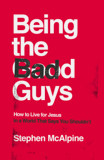The Good Book Company (Australia) will be closed from Saturday 21st December until Thursday 2nd January. Any orders placed during this time will be held and dispatched on Thursday 2nd January 2025. Emails will still be checked. Apologies for any inconvenience this causes.

Every December, the internet teems with predictions of what the next year will hold. Last year, many 2020 predictions were based on trends gaining traction, like the growth of podcasts and streaming services. Some predicted a rise in travel and a buzz around sports being featured in the summer Olympics for the first time.
No one, to my admittedly limited knowledge, predicted a global pandemic, large-scale lockdowns, and masks becoming a regular feature of fashion.
Some predictions are safe any time though, even in 2020 and as we look ahead to 2021. Here are a few things we can count on in the days to come.
The events of 2020 will affect life in 2021. Schools, companies, and even churches had to adapt this past year. While there are changes to mourn and new concepts to question, some of the lessons learned are worth holding onto.
For example, Will Anderson suggested on The Gospel Coalition website that families make a few of their quarantine rhythms permanent. Many companies will be offering employees greater flexibility for working at home. Churches may want to continue equipping parents for discipleship at home as they develop new mixed-format children’s programs.
Change is inevitable. As believers, we have the privilege of knowing the unchanging God and relying on his unbreakable word. Because our God is reliable, we can face change with hope and certainty. This year, let’s dig deeper into God’s word through daily Bible reading and grow our confidence in God’s faithfulness in new rhythms and challenges.
Belief in one sovereign God, who speaks into issues of identity, sexuality, and morality, is increasingly seen as a threat. We’re often perceived as the “bad guys” in the media and in many social circles. In his upcoming book, Being the Bad Guys, Stephen McApline offers insight into why this is the case and why being the “bad guys” might actually be a really good thing.

How we came to live in a post-Christian culture and how to live for Jesus in it.
"What if being seen as the weirdo is actually our strength?" Stephen asks. With controversy and strife surging this past year, 2021 is a wise time for us to start examining what it means to live for Jesus in a world that says we shouldn’t.
If this subsection were titled, “God will still be God” or “It will all work for good,” many of us might skip right over it even though we believe it. We’re a little hardened to optimistic phrases and definitive statements these days. Given the constantly changing strategies, policies, and messages we’ve heard, “truth statements” feel less reliable and important.
Unfortunately, Christians aren’t immune from this growing sensitivity to taking a stand. Many of us are worn, weary, and Zoom-fatigued. Several reports in 2020 found that Bible reading declined during the pandemic. Pastors and churches often tell us that attendance is down, and many in ministry positions are facing higher levels of anxiety and depression. Conspiracy theories, even in Christian circles, are rampant.
We need to fight the temptation to become calloused toward truth. Because of Christ, we have a reason for hope and confidence that isn’t shaped by circumstances.
This year, will you lean into what is always true? Will you seek out books, media, ministries, and friendships that will root you in the truth, which is good news?
--
Be encouraged as you head into 2021, aware of some things that will definitely happen and nervous about some of the unknowns. “Jesus said, ‘If you hold to my teaching, you are really my disciples. Then you will know the truth, and the truth will set you free’.” (John 8:31-32) Whatever we do or don’t know today, we do know the One who is the truth, and we are free to trust and obey him. That’s not going to change.